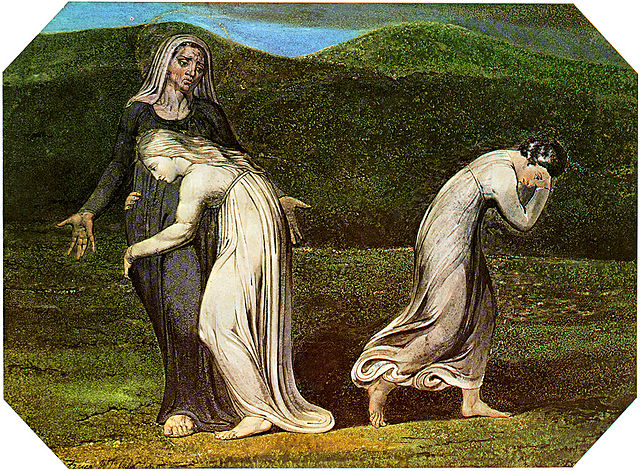 A Biblical example of a non-traditional family.
A Biblical example of a non-traditional family.
Because the family was by its nature a hierarchical institution, it had no place in the Kingdom of God. Jesus made many statements to this effect.
“Whoever comes to me and does not hate father and mother, wife and children, brothers and sisters, yes, and even life itself, cannot be my disciple.” (Luke 14:26)
In modern English this statement implies that one must harbor feelings of hatred or rage or loathing towards one’s family, but the meaning is more nuanced. It is not hatred towards individuals that is called for, but hatred towards these as concepts. Familial relations always imply a hierarchy, whether it be parents over children, husband over wife, or older siblings over younger siblings.
Jesus did not oppose the concept of fraternity or sorority (I use both terms for gender-inclusivity). When Jesus preached in Nazareth and was told that his family sought him, he replied:
“Who is my mother, and who are my brothers?” And pointing to his disciples, he said, “Here are my mother and my brothers! For whoever does the will of my Father in heaven is my brother and sister and mother.” (Matthew 12:48-50)
The only family, Jesus says, are those committed to the Kingdom of God.
Perhaps the most magnificent, illuminating, and dangerous statement Jesus made about the family is from Matthew 10:34-36 during the missionary discourse.
“Do not think that I have come to bring peace to the earth; I have not come to bring peace, but a sword.
For I have come to set a man against his father,
and a daughter against her mother,
and a daughter-in-law against her mother-in-law;
and one’s foes will be members of one’s own household.”
A few things stand out immediately when the entire quote is read apart from the often-taken-out-of-context first line. The first is that the sword has nothing to do with war. It is a sword that severs the ties of family.
A second and more interesting thing is that these family ties are severed precisely along generational lines. Man against father; daughter against mother; daughter-in-law against mother-in-law. Nowhere is it stated more clearly that the biggest problem Jesus has with the family is its hierarchical nature.
Finally, that final line. Entering the Kingdom of God requires more than a mere rejection of familial hierarchy; it requires that one actively oppose it, even against members of one’s own family. Jesus came, simply put, to tear families apart.
Of course there are other passages from the New Testament that provide support for Christian family values. But one must take seriously the possibility (actually, the fact) that these verses form a contradiction with the words of Christ, and all the eisegesis and theological gymnastics in the world cannot change this.
“Traditional Christian values” are rooted not in any teaching of Jesus, or any program instituted by him. Jesus himself came to challenge and subvert the traditional family values of his time. The family values claimed by American Christians today, in reality, are reactionary constructs rooted in conservative, right-wing ideology that has nothing to do with Christ.
Conservative Christian notions of family values are not going anywhere anytime soon. They are reactionary in nature, and as the Left continues to expand and radicalize, there will be a renewed push to defend them. Semi-radical movements such as Black Lives Matter already have the destruction of the nuclear family among their principles, and with increasing acceptance of gay rights, of non-traditional families, of polyamory, reactionary Christians will feel increasingly threatened.
Jesus understood two millennia ago that the traditional family is an institution that only reinforces oppressive hierarchies and maintains class domination. The family under capitalism is no different: instead of domination by an honor-shame dichotomy, capitalism has created “a society in which the system of the family is completely dominated by the system of property” (Engels).
Think of one of the defining characteristics of the nuclear family: homeownership, which was aggressively pushed upon working-class people in the 2000’s. When George W. Bush first proclaimed June to be “National Homeownership Month” in 2002, he gave a statement that extolled the value of homeownership and directly tied it to family values:
“Homeownership encourages personal responsibility and the values necessary for strong families. Where homeownership flourishes, neighborhoods are more stable, residents are more civic-minded, schools are better, and crime rates decline.”
We all remember how the Bush administration’s aggressive push for more Americans to buy homes turned out: we had a housing bubble, which popped, triggering a chain reaction which led to the Great Recession and the destabilization of the world economy. Whether intentional or not, this has resulted in the exacerbation of class domination. The rich are richer than ever and the poor are getting poorer every day.
Any opposition to capitalism must include a strong critique of the “traditional family.” Jesus of Nazareth understood how hierarchy on a micro level reinforces class domination on the macro level. A Christ-centered Christianity which takes this conviction seriously must follow it through to the conclusion that capitalism is incompatible with true Christian values, and must ultimately turn towards socialism.













